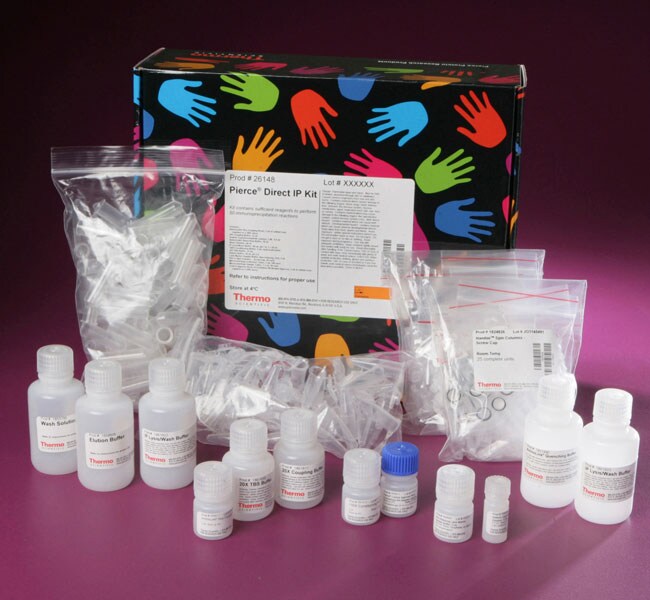
The Thermo Scientific Pierce Direct IP Kit uses an activated resin to covalently immobilize IP antibodies (any species or class) on agarose beads without the aid of Protein A/G, enabling immunoprecipitation without antibody interference.
The primary benefits resulting from this method are the opportunity to use any species or subclass of purified antibody (not just types that bind to Protein A or G) and the ability to purify target protein without contamination by the antibody. The method also makes it possible to immunoprecipitate antigens from serum samples without co-purifying non-target immunoglobulins. Finally, the kit uses microcentrifuge spin cups to effectively wash and separate samples from the beaded agarose resin.
Features of Direct IP Kit:
• Requires less than 10 μg of antibody—optimized procedure requires only 2 to 10 μg of antibody for a single IP experiment, no more than is required for traditional IP methods
• Easy and efficient scalability—use only the amount of antibody needed for a single immunoprecipitation or immobilize 100 to 200 μg of antibody to prepare ready-made IP affinity resin for many experiments
• Minimal antibody contamination—antibody is irreversibly attached to the agarose beads so that co-elution of heavy and light chains with the purified protein is minimized (i.e., less than 5%)
• IP with any species and subclass of antibody—Use chicken IgY, human IgE, mouse IgM or any other purified protein
• Prepared antibody affinity resin is reusable—because the antibody is covalently immobilized and not inactivated by the mild elution procedure, the resin often can be used several times
• Convenient sample handling—spin columns (see dimensions) eliminate resin loss and provide for efficient separation of solutions
• Complete kit—package includes cell lysis buffer and sufficient reagents and spin columns to perform at least 50 antibody immobilizations and IP experiments
• Requires purified antibody—IP antibody solution must be free of BSA, gelatin or other stabilizer proteins; for easy removal of these proteins, see our Antibody Clean-up Kit (Part No. 44600)
Applications:
• Immunoprecipitation followed by electrophoresis and excision of the protein for mass spectrometry or sequencing identification analysis
• Immunoprecipitation and SDS-PAGE analysis of a target protein whose molecular weight is similar to the heavy or light chain antibody fragment
• Immunoprecipitation of target proteins for subsequent analysis by nondenaturing methods (i.e., methods not involving SDS-PAGE)
• Immunoprecipitation with antibodies that do not bind to Protein A, Protein G or Protein A/G
• Immunoprecipitation from serum and other sample that contain immunoglobulins
Direct immunoprecipitation in two easy steps:
Step 1: Attach antibody to agarose resin: The first step in the Direct IP Method is to prepare the IP antibody affinity resin. Pure antibody (see Highlights) is incubated in phosphate buffer with an appropriate volume of AminoLink Plus Coupling Resin, an aldehyde-activated beaded agarose resin. During the incubation, various lysine epsilon-amines on the surface of the large antibody molecule react with aldehyde groups on the resin to form Schiff-base bonds that are then stabilized to secondary amine bonds in the presence of cyanoborohydride. The immobilization reaction, known as reductive amination, is nondenaturing and typically results in greater than 85% antibody coupling efficiency with minimal loss of antigen-binding function.
Step 2: Perform immunoprecipitation experiments: Once prepared, the antibody resin can be used in several parallel aliquots or in total for IP experiments. Antibody resin is incubated with a sample that contains the protein antigen of interest, allowing the antibody:antigen complex to form. After washing to remove nonbound (presumably undesired) components of the sample, the antigen is recovered by dissociation from the antibody with elution buffer supplied in the kit. The entire procedure is performed in a microcentrifuge spin cup, allowing solutions to be fully separated from the agarose resin upon brief centrifugation. Only antigen is eluted by the procedure, enabling it to be identified and further analyzed without interference from antibody fragments. Furthermore, the antibody resin can be reused for additional rounds of immunoprecipitation.
Related Products
Pierce™ Direct Magnetic IP/Co-IP Kit
| Code | Description |
|---|---|
| 26148 | Catalog Number: 26148 |

